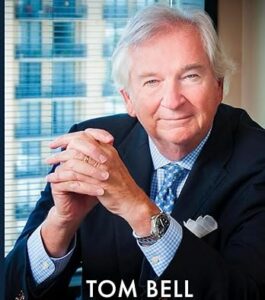
In today’s business world the best leaders do more than run companies. They shape communities influence policy and set standards that last long after they step down from formal roles. True leadership is no longer defined by title or profit margin alone. It is measured by how much good a person does with the responsibility they hold. Few people have embodied this more clearly than Thomas Devereaux Bell Jr. With a career that has touched politics real estate healthcare and corporate governance Bell stands as a strong example of how vision and values can guide business decisions that benefit both shareholders and society.
Born on November two nineteen forty nine in Memphis Tennessee Bell was introduced to the world of public affairs through his father who worked closely with the Tennessee Manufacturers Association. This early connection helped shape his understanding of how policy business and leadership work together. He attended the University of Tennessee but made the bold decision to leave before completing his degree to pursue a rare opportunity in public service. At just twenty three years old Bell became chief of staff for United States Senator Bill Brock. This early start placed him at the center of national politics where he quickly became involved in major Republican campaigns including those of Richard Nixon Lamar Alexander Dan Quayle and Ronald Reagan. These formative experiences gave Bell a clear sense of how government functions how messages shape public opinion and how leadership can drive real change.
With a strong background in politics Bell made a successful transition into the corporate world. He began this phase of his career as president and chief executive officer of the Hudson Institute a well known public policy research organization. His work there involved managing both ideas and operations proving that he could balance high level strategy with practical business decisions. Bell later took on executive roles at Ball Corporation and Young and Rubicam where he led the firm’s public affairs division Burson Marsteller. This role further sharpened his communication skills and deepened his understanding of corporate strategy in complex environments.
Bell’s financial leadership came into full view when he returned to Young and Rubicam in the late nineteen nineties to lead the company through its initial public offering. His clear thinking and careful planning helped the firm become a publicly traded company at a time when investor confidence depended heavily on leadership and transparency. Shortly after the IPO Bell played a central role in one of the largest advertising industry transactions in history. In two thousand Young and Rubicam was acquired by WPP Group for five point seven billion dollars. The deal was a milestone not just for its size but for the way Bell handled it with clarity professionalism and a focus on long term value.
In two thousand two Bell accepted the role of chairman president and chief executive officer at Cousins Properties a real estate investment trust based in Atlanta Georgia. Though he had no formal background in real estate Bell brought strong financial discipline and strategic vision to the firm. His leadership marked a turning point for Cousins Properties. He guided major development projects including the Terminus complex in the Buckhead district and the acquisition of the historic one ninety one Peachtree Tower in downtown Atlanta. These projects showed his commitment to urban development and his ability to steer major investments with care and foresight. Under his leadership Cousins became more efficient more focused and more responsive to both investors and the market. Bell retired from the role in two thousand nine leaving the company well positioned for continued success.
Bell’s influence goes far beyond boardrooms and balance sheets. One of the most meaningful parts of his legacy is his work to save Grady Memorial Hospital a vital healthcare provider for Atlanta’s underserved communities. In two thousand seven the hospital was facing a financial crisis that threatened its future. Bell stepped forward to lead the Greater Grady Task Force a group of business and civic leaders focused on finding a sustainable solution. His efforts led to a major restructuring of the hospital’s governance system replacing the politically appointed board with an independent nonprofit board focused on expertise and accountability. This move helped unlock up to three hundred million dollars in private funding and restored public trust in the hospital’s management. Bell later served as a founding member of the new board and briefly stepped in as interim chair in two thousand eleven after the departure of Peter Andruszkiewicz. For this work he received the National Human Relations Award in two thousand eight and was named Georgia Trend’s Most Respected Business Leader the same year.
Throughout his career Bell has served on the boards of fourteen publicly traded companies including Southern Company Gas Norfolk Southern Corporation and Emory Healthcare. His presence on these boards has been marked by a focus on ethics transparency and long term thinking. He is known for asking smart questions pushing for data driven decisions and encouraging companies to consider their broader social responsibilities. His leadership style combines financial skill with personal integrity making him a trusted advisor across multiple industries.
Bell’s memoir captures the wide scope of his experience. In it he shares lessons from politics business and civic work offering practical advice on how to lead with both heart and strategy. His reflections are grounded in real life moments not abstract theory and they show how important it is to stay adaptable in a changing world. He writes about the importance of listening of staying calm under pressure and of keeping people at the center of every major decision. His story is not about personal glory but about how one person can help many institutions work better and serve more people.
Thomas Devereaux Bell Jr. redefines what it means to be an executive in the modern era. He has shown that leadership is not just about financial results but about lasting contributions to the common good. He has brought people together to solve big problems and has proven that good business and good citizenship can go hand in hand. His work has improved not only the companies he has led but also the communities they serve. In every role from the United States Senate to major corporations to a public hospital in crisis Bell has acted with vision discipline and compassion. His legacy is one of clear purpose careful planning and a deep belief in doing what is right not just what is easy. For anyone who wants to understand how leadership can truly make a difference Thomas Devereaux Bell Jr. offers a powerful example of what is possible when values and strategy work together.





